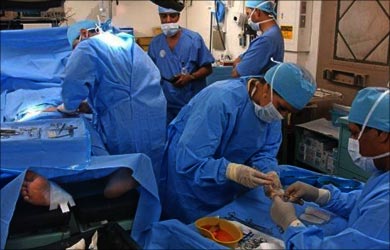Treatment of Osteomyelitis
Early diagnosis reduces the risk of the infection becoming chronic.
Surgery is needed to-

- To harvest deep specimens
- To allow correct microbiological diagnosis
- To remove all the infected material and dead tissue
- To drain soft tissue abscesses
- To salvage the infected implants
- To stabilise the weakened or fractured bone.
Surgery can break the cycle of bone death and allow new viable tissue to enter the infected field, thus allowing the entry of antibiotics and a healthy immune system to enable recovery.
Antibiotics have a role to treat infection in viable tissue and will not work in the presence of abscesses and dead bone.

Surgery is also best performed when the patient has been on antibiotics for at least ten days.
Antibiotics also protect the patient against spreading infection.
Antibiotics are chosen after considering the likely pathogens and the level of risk and should avoid the development of drug resistant organisms. It is necessary to culture the organism, but empiric therapy will be required until culture reports are available. An infectious disease specialist should be consulted too.
Anti Tuberculous treatment should be initiated in Tuberculous Osteomyelitis.






